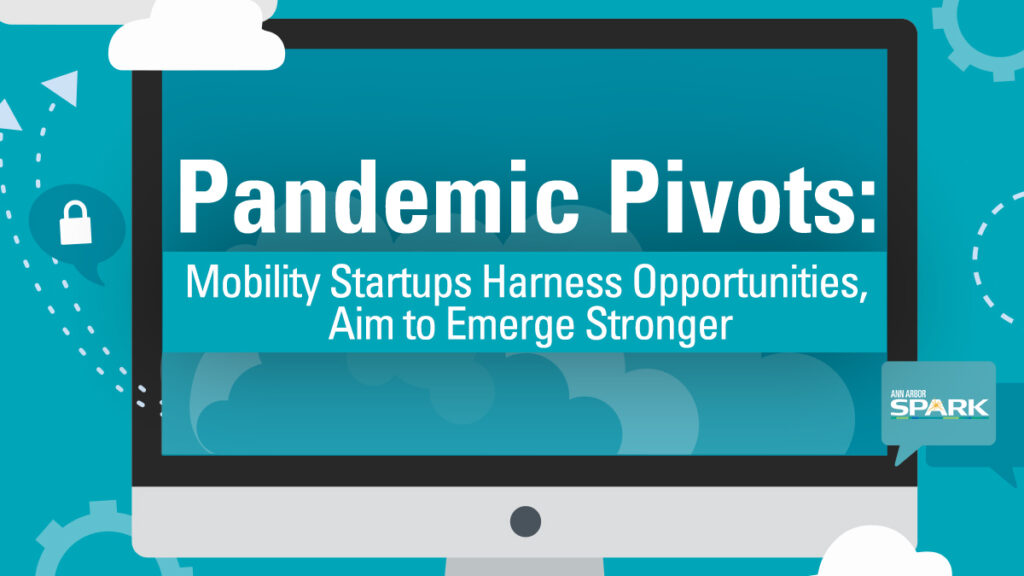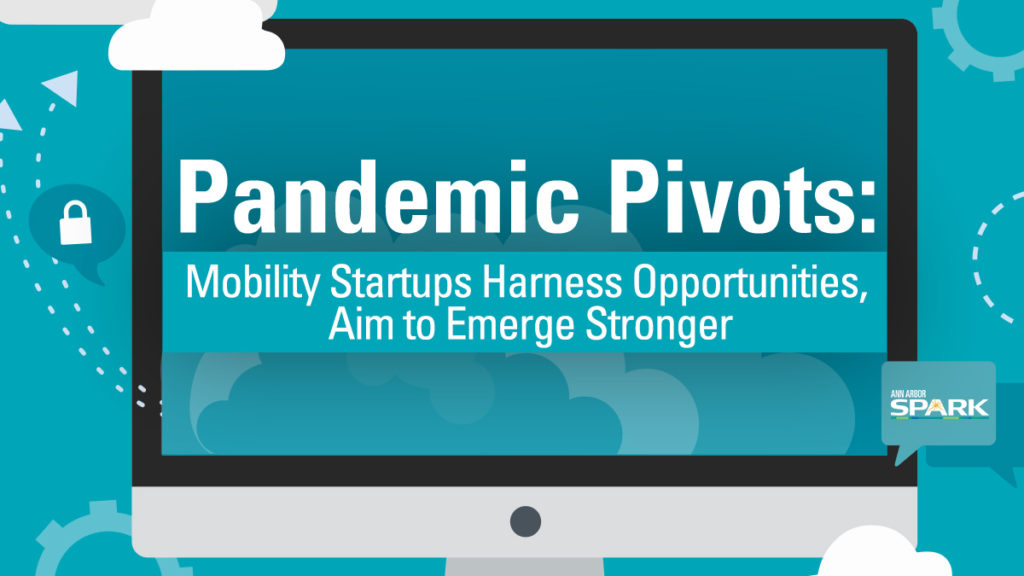

Over the past several months, Ann Arbor SPARK has hosted a webinar series called Pandemic Pivots. This lunch series featured Ann Arbor mobility startups that shifted their business strategies in response to changing markets and consumer demand as a result of COVID-19. During the events, business leaders shared key learnings about building more resilient companies during this crisis and beyond. We’ve outlined some of those key learnings.
A special thanks to the following individuals for sharing their perspectives during our Pandemic Pivots events:
- Tara Lanigan, director of policy and advocacy, May Mobility
- Rachel Kosla, community development manager, Feonix – Mobility Rising
- Tony Lancione, vice president and co-founder, IndustryStar
- Shadi T. Mere, CEO, Bedestrian
- Michael Sare, principal solutions engineer, Voxel51
- Sudhi Uppuluri, chief technology officer and co-founder, GreenRoute
- Prashant Salla, founder, FixMyCar
Anticipate Risks
One explanation for the devasting impact of the COVID-19 pandemic on our communities is that many governments and industries failed to anticipate the risk of a pandemic. Without anticipating this risk, they were unable to put safeguards in place to protect citizens and businesses.
According to Michael Sare at Voxel51, the most resilient companies have the skills to anticipate risk and pivot. The startup, whose core capability is around computer vision, identified downstream opportunities and harnessed them to create the Physical Distancing Index — a community-focused resource. This index monitored streets in major cities using camera feeds and provided the community with transparency around how streets are being used during the pandemic. Michael urges business leaders to anticipate risk early and frequently by matricizing the pros and cons of crucial decisions.
Bedestrian’s Shadi Mere spoke about the halting of their pilot at Beaumont in Dearborn as the whole hospital shifted focus to COVID-19. The discontinuation resulted in Bedestrian pivoting to accommodate the immediate needs of clients as well as anticipate the lasting impact of this crisis on their market. They doubled down on innovation like adding contactless features as well as expanding their teleoperation offerings to senior care facilities where there was a shortage of skilled nurses.
Metrics for Success
Markets and consumer needs have shifted dramatically during the pandemic. Tara Lanigan discussed how May Mobility is adjusting to come up with new, relevant success metrics. Pre-pandemic, the key success metric at May Mobility was ridership. However, with fewer people moving around — and even fewer people feeling comfortable in shared vehicles — May Mobility realizes that other metrics may be more important to measure. One of the data points they are considering is engagement. Just because ridership is down does not mean that folks don’t need to get around, and it’s important to engage with these folks to understand their needs. Additionally, May Mobility is tracking and sharing its learnings with industry partners for broader, lasting impact.
Tara also recognizes that people are resilient, and that we will return to share modes of transportation eventually. May Mobility is figuring out how to get back to a place where shared mobility is the future, sooner rather than later. For now, the path to getting back there is ensuring that their vehicles are safe, and not rushing the transition.
Re-Evaluate Market Opportunity
Sudhi Uppuluri of GreenRoute discusses how several industries are experiencing a K-shaped recovery, wherein some businesses are excelling while others are struggling. In the mobility industry, an example of this is the decline of shared modes and the increase in fleet delivery. As GreenRoute sought pilot opportunities for its technology, they recognized this divergence and pivoted their strategy to focus on fleet delivery customers.
Tony Lancione shared how this was apparent for IndustryStar. During the pandemic, IndustryStar customers used their software to collaborate to solve PPE distribution issues that were front and center during the pandemic. This was a pivot from the core industries that IndustryStar software typically served and allowed them to engage with new partners.
Work Together
At the start of the pandemic, many business leaders perceived that they were alone. For example, May Mobility experienced fear that partners would be upset about service changes. However, May Mobility ended up working collaboratively with these partners because they were also facing similar challenges. Thanks to this collaboration, the partners were able to accomplish even better solutions.
Rachel Kosla of Feonix – Mobility Rising discussed the role of community engagement and bringing stakeholders together through their mobility leadership circle. The goal was to spark greater conversation and joint action at tackling issues around access through their Rider50+ program.
Look to the Future
The pandemic has brought a change in attitudes that likely will impact the way we move even when the pandemic subsides. Two key changes are the flexibility offered by companies to work remotely and an increasing dependence on delivery models. Fifteen-minute neighborhood ideas have been around for centuries but are now being revisited with a new dynamism. Biking and walking rates are now at their highest in many cities in the U.S. while segments of our society remain without mobility access, and these gaps are untapped opportunities for new business models to emerge.
A common theme shared by panelists was the urging of entrepreneurs to accelerate and not slow down. Anticipate the risk, double down on innovation, and continue focusing your energy to solve the problems you set out to do. Historically, major disruptions have fueled some of the greatest startups.
Strong business leaders are not viewing the pandemic in a vacuum. Rather, they are looking deeply at all aspects of their operations and extrapolating learnings that can be carried with them even after the pandemic subsides.
“Lean on others,” advises Tara Lanigan. Invest in building a network that isn’t limited to business transactions and could be a way to support each other.
Sudhi shared that this pandemic has underscored that some people will never look to data or science to inform their decisions. When talking about GreenRoute, Sudhi often discusses it within the context of climate change. Some people don’t believe in climate change. He shares that no matter how compelling the problem and solution, there will be people who just won’t believe it. He encourages others (and his future self) to not take those dismissals personally. Rather, rally people around you that have the right mindset and direction.
Interested in learning more?
Watch the Pandemic Pivots webinars.
- Pandemic Pivots: Ann Arbor Mobility Startups Responding to COVID-19 featuring Voxel51, IndustryStar, and Bedestrian
- Pandemic Pivots: Ann Arbor Mobility Startups Responding to COVID-19 featuring May Mobility and Feonix – Mobility Rising
- Mobility Meetup: Scaling During a Pandemic featuring GreenRoute and FixMyCar